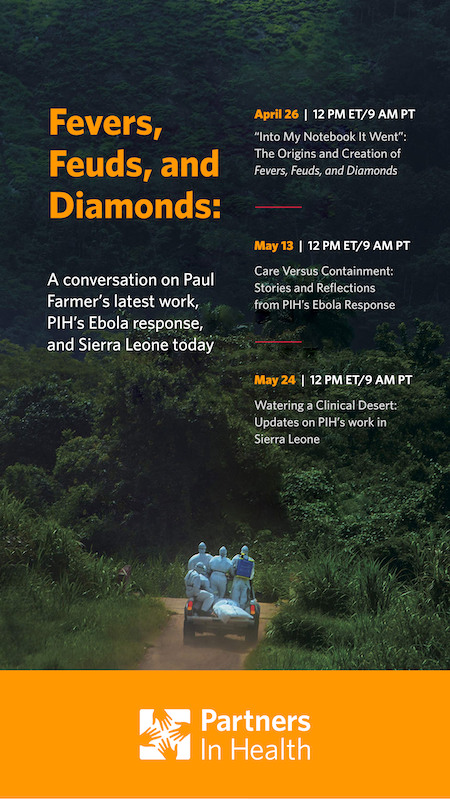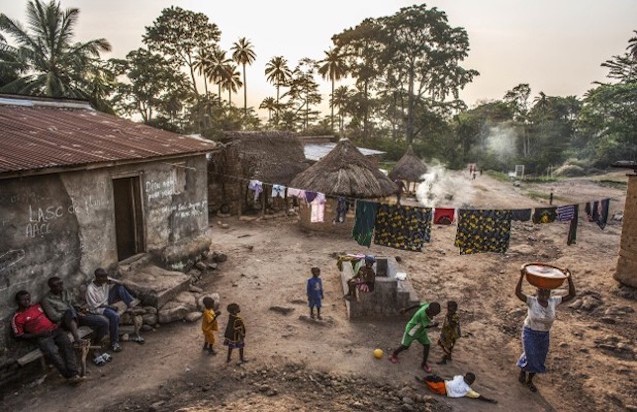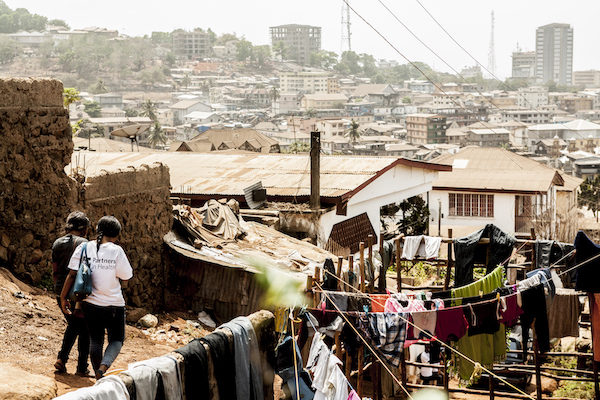Fevers, Feuds, and Diamonds: A conversation on Paul Farmer’s latest work, PIH’s Ebola response, and Sierra Leone today
In spring 2021, PIH hosted a series of conversations around Paul Farmer’s latest book, Fevers, Feuds, and Diamonds: Ebola and the Ravages of History. Jon Lascher, advisor to the executive director of PIH Sierra Leone, hosted these conversations with Dr. Paul Farmer, PIH co-founder and chief strategist, and colleagues across PIH who fought Ebola and now lead our health system strengthening work in Sierra Leone. These conversations went behind the scenes of Paul’s experience writing this defining text; discussed firsthand accounts from PIH’s work inside Ebola treatment units; and gave updates on our current and future work in Sierra Leone, from battling COVID-19 to solving the country’s longtime maternal health crisis. We invite you to listen to recordings of these conversations to learn more about health, humanity, and history in West Africa, and how we can apply the important themes and lessons from Paul’s book to the current pandemic and to our shared work toward global health equity. Below, we’ve also shared a look into Paul's book by posting a photo journal from the 2014 Ebola outbreak in West Africa.

Event Recordings
"Into My Notebook It Went”: The Origins and Creation of Fevers, Feuds, and Diamonds: https://www.youtube.com/watch?v=ZluBkdGB7og
Care Versus Containment: Stories and Reflections from PIH’s Ebola Response: https://www.youtube.com/watch?v=JcAzTR1akc4
Watering a Clinical Desert: Updates on PIH’s work in Sierra Leone: https://www.youtube.com/watch?v=fxSl5tXAPnY
Fevers, Feuds, and Diamonds: Ebola and the Ravages of History Photo Journal
"As with COVID-19, the disease caused by a novel coronavirus, a lot of published or broadcast Ebola commentary did discuss where the epidemic had originated and hypothesized about how it had spread. The latter was never a mystery: for centuries, footpaths and river crossings, along with shared languages and cultures and family ties, have bound the eastern reaches of Sierra Leone, Liberia, and Guinea into a single ecological and social zone sometimes termed ‘Upper West Africa.’ The epidemic was fueled and sustained within this three-country region by everyday acts of caregiving, the mundane yet sacred obligations people felt to nurse the sick and bury the dead—without the PPE, or personal protective equipment, that such duties often require."
Paul Farmer, Fevers, Feuds, and Diamonds: Ebola and the Ravages of History


“Ebola and other public-health calamities strike most often in places from which human capital and raw materials have been extracted for centuries. From the rural reaches of Haiti and Rwanda, from the prisons of Siberia, and from the slums of urban Peru: for thirty years, I’ve been pointing out how the epidemics that people have suffered in these places have arisen because of the inequalities—political, economic, and medical—that such extraction invariably worsens.”
Paul Farmer, Fevers, Feuds, and Diamonds: Ebola and the Ravages of History



“I couldn’t shake the feeling that Ebola was a fire that we had an ethical obligation to fight. Saving lives is, after all, what doctors and nurses take oaths to do. Even after tardy WHO warnings and appeals for assistance, however, a familiar and unambitious logic proliferated in public-health circles around the world: the priority was containment, not delivery of clinical services. This was clinical nihilism: the tools and funding required to improve supportive and critical care, we heard every damn day, were not in the budget. But if Ebola wasn’t in the budget, didn’t that mean that the budget, not the virus, was wrong?”
Paul Farmer, Fevers, Feuds, and Diamonds: Ebola and the Ravages of History

“Perfect storms strike in perfect conditions, but, as Albert Camus said, they are long in the making. The long history of injury and injustice and extraction in West Africa made the Ebola crisis feel inevitable. What is not inevitable, however, is the cynical notion that misery and privation will continue unabated in the region. With a modicum of investment, a larger dose of social justice, and attention to the needs of those already sick or injured, the disastrous health conditions of this region can be reversed.”
Paul Farmer, Fevers, Feuds, and Diamonds: Ebola and the Ravages of History


“If there’s a lesson to be learned from Ebola, it may be this one: for everything we do, or say, in pandemic time, let’s keep asking the same question. Might this help?”
Paul Farmer, Fevers, Feuds, and Diamonds: Ebola and the Ravages of History